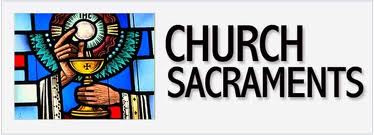Sacraments

The Sacraments of the Catholic Church
Jesus’ chosen way of gifting His life of grace to us for all time.
“Christ instituted the sacraments of the new law. There are seven: Baptism, Confirmation, the Eucharist, Penance, the Anointing of the Sick, Holy Orders and Matrimony. The seven sacraments touch all the stages and all the important moments of Christian life: they give birth and increase, healing and mission to the Christian’s life of faith. There is thus a certain resemblance between the stages of natural life and the stages of the spiritual life.” (Catechism of the Catholic Church, 1210.)
The Sacraments of Initiation
 |
|
Baptism of Children
We as Catholics, heed the call of Christ to“let the Children come to me.” Mark 10:14Baptism of Children is one of the great giftsthat we give to our children. We, as parents and parish, promise to let our children know the faith that we hold so dear.”Holy Baptism is the basis of the whole Christian life, the gateway to life in the Spirit, and the door which gives access to the other sacraments. Through Baptism we are freed from sin and reborn as sons and daughters of God; we become members of Christ, are incorporated into the Church and made sharers in her mission…” (Catechism of the Catholic Church, 1213)
Holy Eucharist
“At the heart of the Eucharistic celebration are the bread and wine that, by the words of Christ and the invocation of the Holy Spirit, become Christ’s Body and Blood. Faithful to the Lord’s command the Church continues to do, in his memory and until his glorious return, what he did on the eve of his Passion: “He took bread… .” “He took the cup filled with wine. . . ” The signs of bread and wine become, in a way surpassing understanding, the Body and Blood of Christ.” (Catechism of the Catholic Church, 1333)
Source and summit: The Eucharist is the “source and summit of the Christian life,” and the third sacrament of initiation. “It is the culmination both of God’s action sanctifying the world in Christ and of the worship men offer to Christ and through him to the Father in the Holy Spirit.” (Catechism of the Catholic Church, 1324,1325)
Weekend Mass Schedule
Saturday 7:30 pm St. Viator Parish
Sunday 9:00 am Corpus Christi
Sunday 11:15 am St. Viator Parish
 Confirmation
Confirmation
“The reception of the sacrament of Confirmation is necessary for the completion of baptismal grace. For “by the sacrament of Confirmation, [the baptized] are more perfectly bound to the Church and are enriched with a special strength of the Holy Spirit. Hence they are, as true witnesses of Christ, more strictly obliged to spread and defend the faith by word and deed.” (Catechism of the Catholic Church, 1285)
 Confession and Reconciliation
Confession and Reconciliation
“To those who have been far away from the sacrament of Reconciliation and forgiving love, I make this appeal: Come back to this source of grace; do not be afraid! Christ himself is waiting for you. He will heal you, and you will be at peace with God!” Pope John Paul II
“When he celebrates the sacrament of Penance, the priest is fulfilling the ministry of the Good Shepherd who seeks the lost sheep, of the Good Samaritan who binds up wounds, of the Father who awaits the prodigal son and welcomes him on his return, and of the just and impartial judge whose judgment is both just and merciful. The priest is the sign and the instrument of God’s merciful love for the sinner.” (Catechism of the Catholic Church, 1465)
The Sacrament of Penance is the sacrament of spiritual healing. Reconciliation involves contrition, confession to a priest, absolution by the priest, and penance. After making an examination of conscience, the penitent confesses his/her sins to the priest, who is the minister of Christ’s mercy. The intent of this sacrament is to provide healing for the soul as well as to regain the grace of God, lost by sin.
Saturdays from 6:30 to 7:15 pm or by appointment
 Getting Married
Getting Married
“The matrimonial covenant, by which a man and a woman establish between themselves a partnership of the whole of life, is by its nature ordered toward the good of the spouses and the procreation and education of offspring; this covenant between baptized persons has been raised by Christ the Lord to the dignity of a sacrament.” (Catechism of the Catholic Church, 1601)
Marriage is a total pledge of two people to a life long commitment together. In view of this, the many crisis’s that are faced by young married couples, and the unfortunate increase in the number of broken marriages today, we as pastors are convinced that it is of great importance that all people contemplating marriage be given every assistance in the proper and adequate preparation for this step in their lives.
Please check with the Parish Office for the most current Marriage preparation schedule.
 Holy Orders
Holy Orders
“Holy Orders is the sacrament through which the mission entrusted by Christ to his apostles continues to be exercised in the Church until the end of time: thus it is the sacrament of apostolic ministry. It includes three degrees: episcopate, presbyterate, and diaconate.” (Catechism of the Catholic Church, 1536)
“The sacrament of Holy Orders is conferred by the laying on of hands followed by solemn prayer of consecration asking God to grant the ordained the graces of the Holy Spirit required for his ministry. Ordination imprints an indelible sacramental character.” (Catechism of the Catholic Church, 1597) For information on the Priesthood or Permanent Diaconate please call Fr. David at (204) 638-4892.
 Anointing of the Sick
Anointing of the Sick
This sacrament is primarily intended for any who suffer from serious or chronic physical or emotional illness or who struggle with the infirmities of age. One need not be in danger of death nor does the Church anoint one who has already died.
Anointing of the Sick includes (CCC 1519):
- The laying on of hands by the priest.
- Prayer over the person “in the faith of the Church.”
- Anointing with oil blessed by the bishop.
This sacrament has a powerful effect upon the sick person (CCC 1520-21):
- Strengthening, peace and courage to overcome the difficulties that go with the condition of serious illness or the frailty of old age”
- “Healing of the soul, but also of the body if such is God’s will.
- Forgiveness of sin.
- “Union with the passion of Christ.” One’s suffering becomes “a participation in the saving work of Jesus.”
- Allows the sick person, by their suffering, to “contribute to the good of the People of God,” building up the holiness of the Church and all people.
- “A preparation for the final journey.”
Please contact the parish office by calling 204-638-4892
Becoming Catholic “Rite of Christian Initiation of Adults”(RCIA)
To welcome adults, we follow the ancient process of formation of candidates for Baptism or Full-communion.
This begins in November and follows the Church year until the end of the Easter season.





